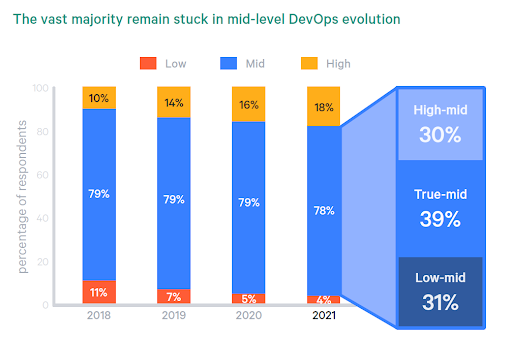DevOps is a set of practices, tools, and a philosophy that automates and combines software development and IT teams’ processes. Team empowerment, communication and collaboration between cross-functional teams, and technology automation are all emphasized. Working in DevOps, however, comes at a cost. DevOps managers, specialists, and programmers are going to find it more difficult than ever to strike a work-life balance, given the increased demand of digital firms and online brands today.
What you'll find in this article [hide]
Work-life balance with DevOps
A work-life balance is essential so that you are committed not only to your work and career but also to the things that matter most in your daily life. Maintaining mental and physical health, both at work and home requires a sense of balance.
The Importance of Effective Communication
Did you know that on average DevOps Engineers may be required to work 50+ hours per week on occasion due to a deadline or an installation? But such workloads should not be the rule rather than the exception. The first step to preventing workloads is ‘effective communication’! Not prioritizing internal communication often slows the project development process and leads to negative feedback from the consumers. With effective communication, DevOps employees can work with their supervisors to put deadlines back when necessary by conveying their progress to maintain a good understanding with the management.
2021 State of DevOps Report presented by Puppet
Set the goals that you can achieve in a day
Setting up daily goals and eliminating time hogs are crucial as they give employees a sense of the work progress on how much they have to accomplish in a day. These practices can help in maintaining a good sense of work structure. Also, working in a cool temperature environment, picking frequent coffee breaks can aid employees to avoid burnout and get more work done in less time.
Pick the Right Company which values work-life balance
Understanding what the most essential career criteria are to the DevOps Engineer is the key to a successful placement for both the individual and the employer. The easy part for applicants includes matching technical skills; the challenge emerges when they must discover a business culture that promotes work-life balance. To avoid these problems, team up with a recruiter you know and who has already placed other IT specialists with the organization. It’s also advised to conduct extensive research about the company’s values to align with what’s best for you.
Evolving with DevOps:
Do you feel as if you are stuck in the middle of DevOps Transformation and surrounded by blockers? You are not alone! According to the 2021 State of DevOps survey, this stagnant feeling is pretty common among DevOps professionals.

2021 State of DevOps Report presented by Puppet
The key to escaping the middle ground is to adopt an effective teamwork platform as it requires well-defined team tasks and interactions. This strategy should be followed by the entire organization. It gives much better clarity and collaboration during events where important decisions are to be made such as policy changes, investments, and willingness to accept risks.
Growing with DevOps requires one to examine the bigger trends that have emerged in the IT infrastructure. It is imperative to look towards higher levels of development and ask, “What does it mean to work in operations in a world where infrastructure is becoming more detached, and will it ever get fixed?”
As DevOps adoption grows and aids individuals in digital business success, it is important their teams need to possess the necessary skills and expertise to provide rapid high-quality software solutions.
We at Apex Global are aimed at providing transformative certifications that initiate a culture of knowledge sharing which ultimately helps in creating a successful team platform and validates one’s DevOps expertise. Register now to our DevOps Certification Programs to solve new challenges, reduce costs, increase agility, shorten release cycles, improve reliability, and stay ahead of the competition!
More details about our DevOps Learning Track:


